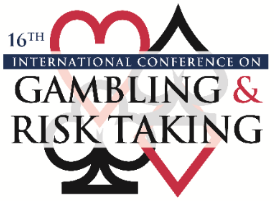Session Title
Session 2-4-F: Trends in New Gaming
Presentation Type
Event
Location
The Mirage Hotel & Casino, Las Vegas, Nevada
Start Date
8-6-2016 4:00 PM
End Date
8-6-2016 5:30 PM
Disciplines
Leisure Studies | Other Sociology | Social Psychology | Social Psychology and Interaction | Sociology
Abstract
Simulated digital youth gambling is an area if concern among researchers and professionals. Of particular interest is the association between simulated and monetary gambling, and it has been suggested that some young people might migrate from simulated digital, free-to-play gambling with virtual currencies to gambling with real money. Research in the field of simulated digital youth gambling is relatively sparse, and lately researchers have been calling for longitudinal and qualitative research. The present study address this call and presents findings from a qualitative longitudinal study of gambling behaviors among Danish adolescents based on a cohort of 51 young Danes. Data has been collected over a three year period with three waves of interviews with a 10 to12-month frequency. Motivations for engaging in simulated gambling factors and processes related to transitions from simulated digital gambling to money gambling activities were of special attention. Findings indicate that for some young people, simulated digital gambling serves as a digitally facilitated form of sociality and also as a skill-building activity in relation to subsequent monetary gambling.
Keywords
Simulated digital gambling, Youth, Qualitative methods, Longitudinal, Denmark
Included in
Leisure Studies Commons, Other Sociology Commons, Social Psychology Commons, Social Psychology and Interaction Commons
From Playing for Fun to Gambling for Money: A Qualitative Longitudinal Study of Simulated Digital Gambling among Danish Adolescents
The Mirage Hotel & Casino, Las Vegas, Nevada
Simulated digital youth gambling is an area if concern among researchers and professionals. Of particular interest is the association between simulated and monetary gambling, and it has been suggested that some young people might migrate from simulated digital, free-to-play gambling with virtual currencies to gambling with real money. Research in the field of simulated digital youth gambling is relatively sparse, and lately researchers have been calling for longitudinal and qualitative research. The present study address this call and presents findings from a qualitative longitudinal study of gambling behaviors among Danish adolescents based on a cohort of 51 young Danes. Data has been collected over a three year period with three waves of interviews with a 10 to12-month frequency. Motivations for engaging in simulated gambling factors and processes related to transitions from simulated digital gambling to money gambling activities were of special attention. Findings indicate that for some young people, simulated digital gambling serves as a digitally facilitated form of sociality and also as a skill-building activity in relation to subsequent monetary gambling.


Comments
Attachment: PDF containing 24 slides
Title slide: Playing for Fun or Gambling for Money? A Qualitative Longitudinal Study of Simulated Gambling among Young Danes